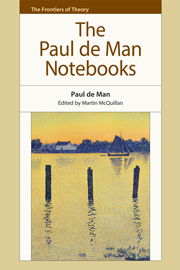Book contents
- Frontmatter
- Contents
- Series Editor's Preface
- Acknowledgements
- Dedication
- Introduction: ‘The Unimaginable Touch of Time’: The Public and Private in the Notebooks of Paul de Man
- PART I Texts
- 1 The Drawings of Paul Valéry (1948)
- 2 Jacques Villon (1952)
- 3 Graduate Essay on Keats (1954)
- 4 Postdoctoral Essay on Symbolism (c. 1960)
- 5 Introduction to Madame Bovary (1965)
- 6 Introduction to The Portable Rousseau (1973)
- 7 On Reading Rousseau (1977)
- 8 Translator's Introduction to “Rousseau and English Romanticism” (1978)
- 9 Rousseau and English Romanticism (1978)
- 10 Introduction to Studies in Romanticism (1979)
- 11 Hommage à Georges Poulet (1982)
- 12 A Letter from Paul de Man (1982)
- 13 Reply to Raymond Geuss (1983)
- 14 Interview with Robert Moynihan (1984)
- PART II Translations
- PART III Teaching
- PART IV Research
- Appendix. The Notebooks of Paul de Man 1963–83
- Bibliography
- Index of Names
5 - Introduction to Madame Bovary (1965)
from PART I - Texts
Published online by Cambridge University Press: 05 December 2014
- Frontmatter
- Contents
- Series Editor's Preface
- Acknowledgements
- Dedication
- Introduction: ‘The Unimaginable Touch of Time’: The Public and Private in the Notebooks of Paul de Man
- PART I Texts
- 1 The Drawings of Paul Valéry (1948)
- 2 Jacques Villon (1952)
- 3 Graduate Essay on Keats (1954)
- 4 Postdoctoral Essay on Symbolism (c. 1960)
- 5 Introduction to Madame Bovary (1965)
- 6 Introduction to The Portable Rousseau (1973)
- 7 On Reading Rousseau (1977)
- 8 Translator's Introduction to “Rousseau and English Romanticism” (1978)
- 9 Rousseau and English Romanticism (1978)
- 10 Introduction to Studies in Romanticism (1979)
- 11 Hommage à Georges Poulet (1982)
- 12 A Letter from Paul de Man (1982)
- 13 Reply to Raymond Geuss (1983)
- 14 Interview with Robert Moynihan (1984)
- PART II Translations
- PART III Teaching
- PART IV Research
- Appendix. The Notebooks of Paul de Man 1963–83
- Bibliography
- Index of Names
Summary
Ever since its publication in 1857, Madame Bovary has been one of the most discussed books in the history of world literature. Despite the distinction and importance of his other novels, Flaubert had to reconcile himself to the fact that he became known, once and forever, as the author of Madame Bovary. The popularity of the novel has increased rather than diminished with time. Numberless translations exist in various languages; the word “bovarysme” has become part of the French language; the myth surrounding the figure of Emma Bovary is so powerful that, as in the case of Don Quixote, or Don Juan, or Faust, one has to remind oneself that she is a fiction and not an actual historical person; the literary influence on subsequent novelists in France and elsewhere is of determining importance and the critical response to the book is of such high quality that it can be said, without exaggeration, that contemporary criticism of fiction owes more to this novel than to any other nineteenth-century work.
Why this extraordinary response to a work which, for its author, was to be primarily an exercise preparatory to later novels? The first notoriety of Madame Bovary was due to a succès de scandale, the curiosity awakened by a publication judged scandalous enough to excite the ire of the censors. The 20,000 or 30,000 readers who bought the earliest edition published by Michel Lévy may have been somewhat disappointed to discover a book that was severe rather than salacious.
- Type
- Chapter
- Information
- The Paul de Man Notebooks , pp. 62 - 68Publisher: Edinburgh University PressPrint publication year: 2014



